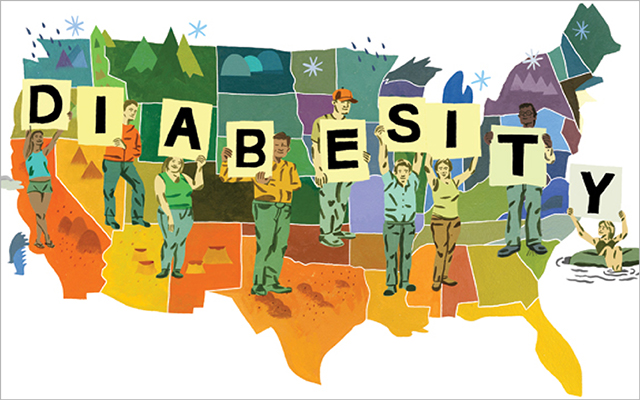Public-health messages that obesity is a “disease” may have significant positive and negative psychological effects, a recent study found.
While the delineation reduced feelings of shame and boosted self-esteem in obese study participants, those who were exposed to the “disease” label and similar messages placed less importance on dieting, reported less concern about weight, and chose less healthy food options — all downsides, according to the study authors.
“A disease-based … weight-management message weakened the importance placed on health-focused dieting and reduced concerns about weight among obese individuals — the very people whom such public-health messages are targeting,” reported Crystal L. Hoyt, a study co-author and psychological scientist from the University of Richmond. Because this led to higher-calorie food choices, the researchers concluded that the disease label had “negative implications … for self-regulation.”
(RELATED: 5 Myths About Obesity and Diabetes that Keep Us Sick)
The study, originally published in November 2013 in the journal Psychological Science and updated in April, was inspired by the American Medical Association’s official declaration last year that obesity is a “multi-metabolic and hormonal disease state.”
As Hoyt and co-author Jeni L. Burnette explained in a recent The New York Times Op-Ed:
“On its surface, this seemed like a good move: Calling obesity a disease provides a clear warning of the significant health risks associated with excessive weight. And the obesity-is-a-disease message sparked attention, funding, and research aimed at finding medically driven remedies.
“We wondered, however, if there also might be psychological ramifications inherent in that message. Would it reduce or add to the burden of body-image concerns and shame? Would it empower people to fight back, or lead to a fatalistic acceptance of being overweight?”
Coyt and her team performed three studies of more than 700 people that involved asking participants to read one of three messages: a newspaper article about the AMA’s decision to label obesity a disease; an informational public-health message about weight-loss goals in general that did not mention whether obesity is or is not a disease; or an article specifically stating that obesity is not a disease.
The participants, who were classified as either “average weight” or “obese” based on their body mass indexes and World Health Organization guidelines, then answered questions relating to health, weight, weight loss, and eating behavior. The participants were also asked to select a sandwich from a menu with options ranging from 230 to 980 calories.
According to the researchers, obese participants who read the “obesity is a disease” article reported feeling less interested in “health-focused dieting” and less concerned about weight than participants who read one of the other two articles. They also selected higher-calorie sandwiches.
“Suggesting that one’s weight is a fixed state — like a long-term disease — made attempts at weight management seem futile, and thus undermined the importance that obese individuals placed on health-focused dieting and concern for weight,” Hoyt and Burnette concluded. “Calling obesity a disease may make people feel better about their bodies, but it also may contribute to the maintenance, rather than reduction, of obesity.”
The researchers said the ideal public-health message would boost self-esteem while also encouraging dieting and other weight-loss efforts.
While Experience Life supports efforts that improve feelings of self-worth, the idea that a low-calorie diet will necessarily lead to better health is at odds with the magazine’s mission: to help people create “healthy bodies through a realistic, sustainable way of life.”
Research has shown that not all calories are equal, that fat isn’t evil, that eating whole foods mindfully is more beneficial to long-term health than going on a restrictive diet, and that obesity truly is a metabolic and hormonal disease state created, in part, by the food industry (as detailed in the new movie Fed Up, in theaters now).
Additionally, sustainable weight loss involves more than eating less and moving more. As psychotherapist Doris Wild Helmering told Experience Life in 2006, “Weight loss starts with the brain, not the belly.”
For additional information and resources on healthy weight loss, check out these articles from our archives:
- Weight Loss Rules to Rethink
- Weight Loss 101
- The Fit Way to Weight Loss
- Intuitive Eating for Weight Loss
- Calories and the Importance of Food Quality
- The Weight of Words
Tell us: Do you believe that practicing self-acceptance is “fatalistic” and bound to lead to unhealthy choices? Does self-acceptance mean giving up, or can it lead to positive, healthy actions? Share your thoughts in the comments, on Facebook, or via Twitter @ExperienceLife.



This Post Has 0 Comments